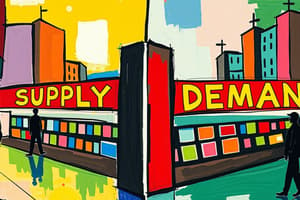Podcast
Questions and Answers
What does scarcity refer to in economics?
What does scarcity refer to in economics?
- The ability to produce more goods than needed.
- The availability of goods in abundance.
- Limited resources compared to unlimited wants. (correct)
- The imbalance between supply and demand.
What is microeconomics most concerned with?
What is microeconomics most concerned with?
- Trade balance and exchange rates.
- The economy of the entire nation.
- Employment rates and inflation.
- Individual consumers and firms. (correct)
Which of the following best describes a market economy?
Which of the following best describes a market economy?
- Firms operate without any restrictions.
- Production is planned by the government.
- Prices and quantities are determined by supply and demand. (correct)
- Economic decisions are controlled by a central authority.
What does GDP measure?
What does GDP measure?
Which type of market structure is characterized by many firms and identical products?
Which type of market structure is characterized by many firms and identical products?
What is the primary focus of fiscal policy?
What is the primary focus of fiscal policy?
What does globalization refer to?
What does globalization refer to?
What is a key component of development economics?
What is a key component of development economics?
Flashcards are hidden until you start studying
Study Notes
Key Concepts in Economics
1. Basic Economic Principles
- Scarcity: Limited resources vs. unlimited wants.
- Supply and Demand: Interaction determines prices and quantity.
- Opportunity Cost: The cost of the next best alternative foregone.
2. Types of Economics
- Microeconomics: Focuses on individual consumers and firms.
- Macroeconomics: Examines the economy as a whole, including inflation, unemployment, and GDP.
3. Economic Systems
- Market Economy: Decisions made by individuals based on supply and demand.
- Command Economy: Central authority makes decisions about production and distribution.
- Mixed Economy: Combination of market and command economies.
4. Key Economic Indicators
- Gross Domestic Product (GDP): Total value of goods and services produced.
- Unemployment Rate: Percentage of the labor force that is jobless.
- Inflation Rate: Rate at which the general level of prices for goods and services rises.
5. Market Structures
- Perfect Competition: Many firms, identical products, easy entry and exit.
- Monopoly: One firm dominates the market with unique products.
- Oligopoly: Few firms dominate the market, often leading to collusion.
6. Fiscal and Monetary Policy
- Fiscal Policy: Government spending and taxation decisions to influence the economy.
- Monetary Policy: Central bank actions that manage the money supply and interest rates.
7. International Economics
- Trade Balance: Difference between a country's exports and imports.
- Exchange Rates: Value of one currency in relation to another.
- Globalization: Increasing interconnectedness of economies, cultures, and populations.
8. Economic Theories
- Classical Economics: Emphasizes free markets, competition, and limited government intervention.
- Keynesian Economics: Advocates for government intervention to manage economic cycles.
- Supply-Side Economics: Focuses on increasing supply (production) to boost the economy.
9. Behavioral Economics
- Studies how psychological factors affect economic decision-making.
- Challenges the assumption of rational behavior in traditional economics.
10. Development Economics
- Focuses on improving the economic conditions of developing countries.
- Emphasizes poverty reduction, education, and health as key areas for development.
Basic Economic Principles
- Scarcity arises from the tension between limited resources and unlimited human wants.
- Supply and demand dynamics dictate market prices and quantities produced.
- Opportunity cost represents the value of the next best choice that is forfeited when making a decision.
Types of Economics
- Microeconomics analyzes the behavior of individual consumers and firms, focusing on specific markets.
- Macroeconomics explores broader economic phenomena, including inflation rates, unemployment levels, and Gross Domestic Product (GDP).
Economic Systems
- A market economy relies on individual decision-making, rooted in supply and demand mechanisms.
- In a command economy, a central authority directs production and distribution decisions.
- A mixed economy merges elements of both market and command systems, leveraging the advantages of each.
Key Economic Indicators
- Gross Domestic Product (GDP) quantifies the total market value of all goods and services produced within a country's borders.
- The unemployment rate measures the proportion of the labor force that is currently jobless and seeking employment.
- The inflation rate tracks the pace at which the overall price level of goods and services increases over time.
Market Structures
- Perfect competition exists when numerous firms offer identical products, facilitating easy market entry and exit.
- A monopoly is characterized by a single firm that dominates the market, providing unique products without close substitutes.
- An oligopoly involves a limited number of firms that have significant market power, potentially leading to collusion among them.
Fiscal and Monetary Policy
- Fiscal policy refers to government strategies involving taxation and spending, aimed at influencing economic activity.
- Monetary policy encompasses actions taken by a central bank to regulate the money supply and set interest rates, affecting overall economic conditions.
International Economics
- Trade balance reflects the difference between a nation’s exports and imports, indicating economic health.
- Exchange rates define the relative value of one currency compared to others, impacting international trade.
- Globalization highlights the expanding interconnectedness of global economies, cultures, and populations.
Economic Theories
- Classical economics champions free markets and competition, advocating minimal government intervention in economic activities.
- Keynesian economics promotes active government involvement to stabilize economic fluctuations and support growth.
- Supply-side economics emphasizes enhancing production capabilities to stimulate economic expansion.
Behavioral Economics
- This branch studies the influence of psychological factors on economic decisions, challenging the notion that individuals always act rationally.
- Insights from behavioral economics inform policies aimed at improving economic outcomes by understanding human motives and behaviors.
Development Economics
- Development economics focuses on enhancing the living standards in developing nations, addressing issues such as poverty and inequality.
- Essential areas for improvement include access to education, health services, and economic opportunities to foster sustainable growth.
Studying That Suits You
Use AI to generate personalized quizzes and flashcards to suit your learning preferences.




